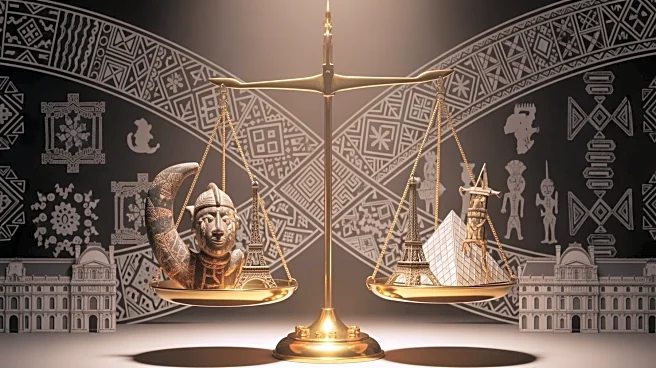What's Happening?
Restitution Day 2025 marks a significant moment in the ongoing efforts to return cultural artifacts and human remains to African nations. This year, France returned the heads of King Toero and two other
resistance fighters to Madagascar, which were taken as trophies by French troops in 1897. Additionally, the Djidji Ayôkwé, a talking drum seized from Côte d'Ivoire in 1916, was returned in July 2025. These actions are part of broader restitution efforts, including a proposed French law to facilitate the return of cultural objects without requiring specific legislation for each item. However, the French government that proposed this law fell due to a vote of no-confidence. Despite these efforts, many African artifacts remain in Western museums, often stored in depots and basements, highlighting the ongoing challenges in achieving full restitution.
Why It's Important?
The restitution of cultural artifacts is crucial for addressing historical injustices and restoring cultural heritage to African nations. These artifacts hold significant cultural and historical value, and their return is seen as a step towards reparative justice. The return of these items can help mend the cultural and historical disconnect caused by colonial plunder. However, the process is fraught with challenges, including legal and logistical hurdles, and the reluctance of some Western institutions to part with these items. The broader significance lies in the potential for these actions to foster better international relations and cultural understanding, as well as to empower African nations in reclaiming their heritage.
What's Next?
Future steps in the restitution process may involve continued negotiations between African nations and Western institutions. The proposed French law, if revisited and passed, could streamline the restitution process. Additionally, there may be increased pressure on other Western countries to follow France's lead in returning cultural artifacts. African nations may also need to address the capacity to preserve and display returned items, which could involve building or upgrading museum facilities. The ongoing dialogue and actions surrounding restitution are likely to continue, with potential implications for international cultural policies and practices.
Beyond the Headlines
The restitution debate also touches on deeper issues of cultural identity and historical narrative. The return of artifacts is not just about physical objects but also about acknowledging and rectifying the cultural oppression experienced by colonized nations. This process can contribute to healing and rebuilding cultural pride and identity. Furthermore, it raises questions about the role of museums and the ethical considerations of holding artifacts from other cultures. The ongoing discussions may lead to a reevaluation of museum practices and the development of more inclusive and respectful approaches to cultural heritage.










